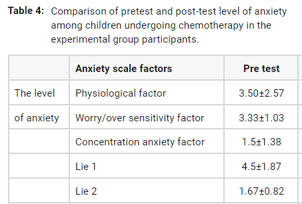Abstract
The present study was undertaken to determine the effectiveness of virtual reality therapy on anxiety and symptom distress with chemotherapy among children with cancer. The present study was quasi experimental design with one group pretest and posttest design. A total of 12 participants were recruited in the study following the inclusion and exclusion criteria. After recruiting the participants, they were assigned to experimental and control groups with six participants in each group. The participant was exposed to virtual reality therapy for at least 30 minutes during the chemotherapy administration. The control group was given the wait list measures at the end of the post test. The presents study results support virtual reality therapy as an effective tool in anxiety and symptom distress with chemotherapy among children with cancer. Further, detailed studies are recommended with higher sample size and multi centers to support the implementation of virtual reality therapy as a therapeutic tool in the management of mental health disorders.
Full text article
Authors

This work is licensed under a Creative Commons Attribution-NonCommercial-NoDerivatives 4.0 International License.

